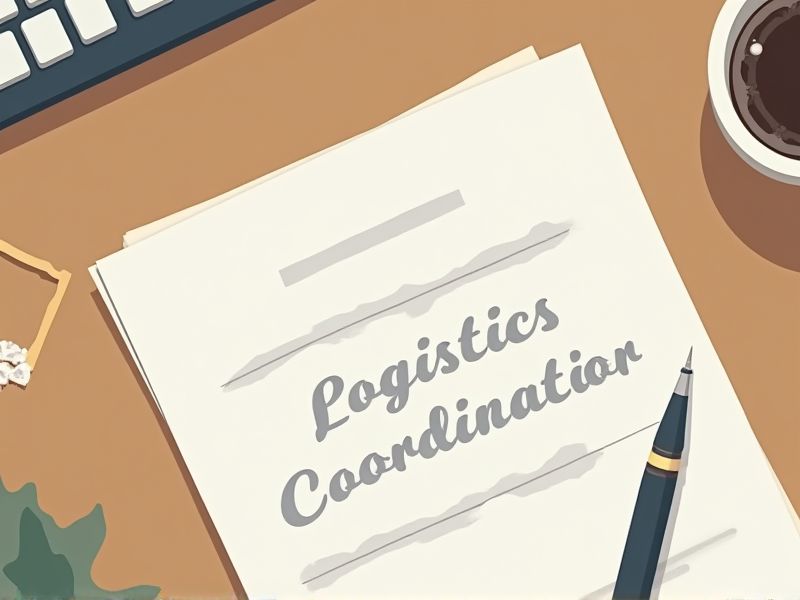
Companies rely heavily on logistics coordinators to streamline supply chain operations and minimize operational costs. Without relevant certifications, these coordinators may lack the necessary skills and knowledge required for efficient organization and management. Certifications validate an individual's expertise in critical areas such as inventory management, transportation, and global logistics. A few important certifications a logistics coordinator may need include Certified Supply Chain Professional (CSCP) and Certified in Production and Inventory Management (CPIM).
Certified Supply Chain Professional (CSCP)
Certified Supply Chain Professional certification enhances a logistics coordinator's understanding of end-to-end supply chain management, leading to improved decision-making. It provides a standardized framework that aligns with global supply chain practices, increasing operational efficiency. The certification expands career opportunities by validating expertise and making professionals more competitive in the job market. Enhanced knowledge from CSCP results in better risk management and cost control, crucial for business profitability.
Certified in Logistics, Transportation and Distribution (CLTD)
Logistics Coordinators benefit from the CLTD certification because it enhances their understanding of industry best practices, leading to improved operational efficiency. The certification provides in-depth knowledge of logistics technologies and global industry standards, which can help in managing complex supply chains more effectively. Companies recognize the CLTD credential as a mark of professionalism, thus increasing job prospects and potential career advancement for certified individuals. The curriculum covers critical topics such as order management and transportation, improving coordination skills crucial for the role.
Certified Professional Logistician (CPL)
Logistics Coordinators benefit from having a Certified Professional Logistician (CPL) because it signals advanced knowledge and competence in managing complex supply chain systems. Employers often prioritize CPL-certified candidates due to their proven ability to enhance operational efficiency and reduce costs. The certification provides a competitive edge, as it covers strategic areas like transportation, distribution, and warehousing. CPL holders demonstrate a commitment to continuous learning, ensuring they stay updated with evolving logistics trends and technologies.
Certified in Production and Inventory Management (CPIM)
Unpredictability in supply chain operations necessitates that logistics coordinators have a deep understanding of inventory management and production planning, which CPIM provides. Certification in CPIM equips logistics coordinators with the ability to streamline operations and reduce costs, directly impacting organizational efficiency. Companies seek professionals with CPIM for their proficiency in optimizing supply chain processes, which ultimately supports maintaining competitive advantage. Acquiring CPIM credentials indicates a commitment to industry standards and continuous improvement, crucial for managing complex logistics networks effectively.
Project Management Professional (PMP)
PMP certification provides logistics coordinators with enhanced project management skills, leading to improved efficiency in handling complex logistics operations. It instills standardized methodologies that help in reducing delays and managing resources effectively, directly impacting cost savings. By having a PMP credential, logistics coordinators often gain increased credibility with stakeholders, facilitating smoother communication and cooperation. As logistics operations frequently involve cross-functional teams, PMP principles aid in ensuring cohesive teamwork and result-oriented outcomes.
Lean Six Sigma Green Belt Certification
Earning a Lean Six Sigma Green Belt Certification enhances a logistics coordinator's ability to identify and eliminate inefficiencies, thereby reducing operational costs. This certification equips them with data-driven methodologies to streamline processes, leading to improved supply chain performance. A logistics coordinator with this credential can better manage variability and defects, ensuring consistent service quality. Their expertise in Lean Six Sigma tools fosters a culture of continuous improvement, directly influencing customer satisfaction and competitive advantage in the logistics industry.
Lean Six Sigma Yellow Belt Certification
Lean Six Sigma Yellow Belt Certification provides Logistics Coordinators with foundational knowledge in process improvement, enhancing their ability to streamline operations. This certification equips them with problem-solving skills that can reduce waste and increase efficiency in logistics processes. By understanding key Lean and Six Sigma principles, coordinators can implement strategies to improve supply chain management. With these skills, logistics coordinators contribute to improving overall operational quality and customer satisfaction.
Certified Supply Chain Analyst (CSCA)
A Certified Supply Chain Analyst (CSCA) credential equips a Logistics Coordinator with a deeper understanding of supply chain processes, leading to improved efficiency. Knowledge gained from CSCA training empowers them to make data-driven decisions, potentially enhancing operational performance. The certification also signals proficiency in supply chain methodologies, which can boost job prospects and career advancement opportunities. Holding a CSCA can provide a competitive edge by ensuring thorough comprehension of industry standards and best practices.
International Certified Logistics Manager (ICLM)
Obtaining the International Certified Logistics Manager (ICLM) credential enhances a logistics coordinator's understanding of global supply chain processes. This certification provides validation of skills and knowledge, which often leads to better career opportunities and job security. With increasing complexities in international trade, ICLM equips professionals with the necessary tools to handle diverse logistical challenges. Companies tend to prefer certified individuals as they bring expertise and efficiency, impacting operational effectiveness positively.
Supply Chain Operations Reference Professional (SCOR-P)
The SCOR-P certification equips a Logistics Coordinator with the ability to efficiently manage and optimize supply chain processes. It provides a structured approach to analyzing and improving logistics operations based on widely recognized best practices. With SCOR-P knowledge, a Logistics Coordinator can better align logistics activities with strategic business objectives and performance metrics. This alignment often leads to enhanced operational efficiency and reduced costs in the supply chain.
Summary
With certifications, you as a Logistics Coordinator can expect increased career opportunities due to enhanced credibility. Employers might recognize your specialized skills, resulting in potential salary growth. Your efficiency is likely to improve, which could lead to better operational outcomes within your organization. This formal validation of skills may enhance your professional network, providing access to industry insights and collaborations.
